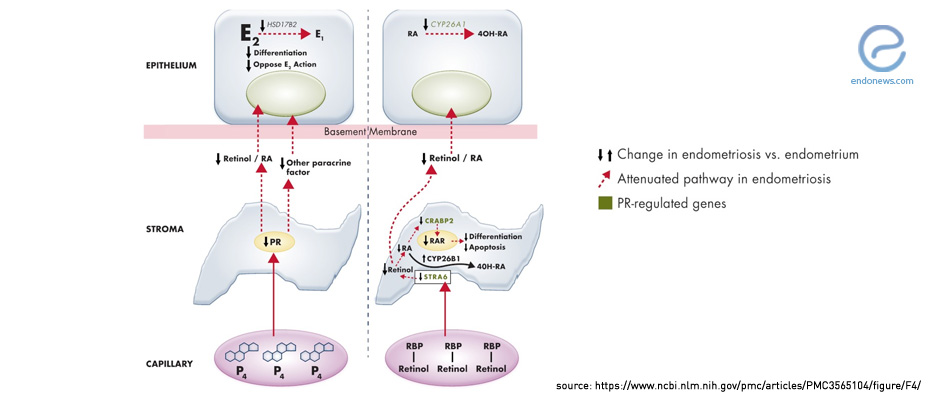Roles of Progesterone in Endometrial Cancer, Endometriosis, Uterine Fibroids, and Breast Cancer
Oct 26, 2017
Progesterone actions in women's health conditions
Key Points
Highlight:
- Progesterone has distinct roles in the pathogenesis of endometriosis, endometrial cancer, uterine fibroids and breast cancer.
Importance:
- Progesterone and estrogen together regulate gonadotropin secretion to prepare the endometrium for pregnancy and breast tissue differentiation. The distinctive actions of estrogen and progesterone in these tissues remains difficult to separate.
- While estrogen has been well associated with the pathologic conditions of the uterus and breast, the complex nature of progesterone actions is difficult to decipher.
What's done here:
- This review provides perspective on the effects of progesterone on the normal endometrium, endometrial cancer, endometriosis, uterine fibroids and breast cancer.
Data:
- Progesterone antagonizes the growth of endometrium stimulated by estrogen.
- Insufficient progesterone increases the risk of endometrial cancer.
- Eutopic and ectopic endometriotic tissues are progesterone-resistant and not fully responsive to progesterone, resulting in proliferation and survival.
- Progesterone promotes growth in uterine fibroids by increasing proliferation, cellular hypertrophy, and deposition of extracellular matrix.
- Progesterone is pro-proliferative and carcinogenic in normal mammary tissue and breast cancer
- The diverse effects of progesterone in these tissues could be due to paracrine interactions between progesterone receptor expressing stroma and epithelial cells. In endometrium where progesterone is anti-proliferative, there are large quantities of distinct stromal cells with high PR expression. In contrast, in the breast and fibroids where progesterone is pro-proliferative, the environment lack organized stromal components with significant PR expression.
Lay Summary
Progesterone is an important hormone, which together with estrogen prepares the women endometrium and breast tissue for pregnancy. The roles of progesterone in human tissues and diseases can be difficult to decipher. While there is a strong evidence for the positive associations of estrogen and endometrial cancer, endometriosis, uterine fibroids, or breast cancer, the actions of progesterone remain unclear. This review article highlight findings and provide perspectives regarding the actions of progesterone in these conditions.
In normal endometrium, progesterone antagonizes estrogen-mediated growth. As a result, the lack of progesterone action increases the risk of endometrial cancer. Additionally, endometriosis is often considered to be progesterone-resistant which contributes to the proliferation and survival of endometriotic tissue. Although progesterone is protective in the endometrium, it promotes growth in uterine fibroids and normal mammary tissue or breast cancer.
The exact mechanisms of such double edge role of progesterone in different tissues are not fully understood. However, a major difference between these tissues where progesterone has the opposing effects on growth is the expression of progesterone receptor in the surrounding stromal cells. Normal endometrium contains distinct stromal cells with abundant progesterone receptor, while breast and fibroids tissues lack specifically organized stromal component with significant progesterone receptor expression. Hence, the diverse roles of progesterone in tissues could be explained by the paracrine interactions of progesterone receptor-expressing stroma and epithelium. Although this unifying perspective may require more data to confirm, it shows the complexity of progesterone biology.
In addition, it also highlights how the tissue microenvironment may strongly influence progesterone function. A better understanding of the background biology will provide rationales for utilizing new compounds such as progesterone receptor modulators in the relevant conditions. New targets may also be identified by studying the external influences affecting progesterone respond, e.g., signaling pathways inhibitor and compounds with direct impact on progesterone receptor protein. In summary, a better understanding of context-specific progesterone functions is useful for treatment approaches in endometrial cancer, endometriosis, leiomyoma, and breast cancer.
conference-preparation

